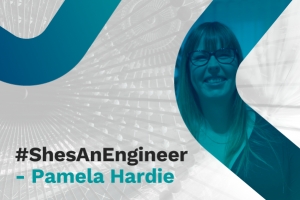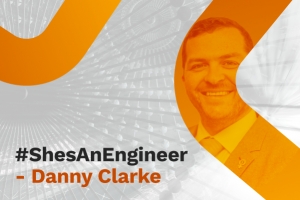Pamela Hardie
Each June, we celebrate International Women in Engineering Day here in the UK, recognising women's inspiring and ground-breaking work in this largely male-dominated field. Well, we firmly believe women in engineering should be celebrated always, so we recently spoke to Pamela Hardie, ISS’s Key Account Portfolio Director for Technical Services..
An ambitious powerhouse in her field, she worked her way up the engineering ladder from Apprentice to Regional Manager in just six years and has been with ISS for over two decades. Here she shares a little about her background, the challenges she’s faced along the way, and her hopes for future female engineers.
The Only Female Apprentice
Pamela encountered a fair amount of opposition to her desire to follow in the footsteps of her electrician father and grow her career in a technical field.
“I took technical studies at school, and I was actually told I shouldn't go ahead and learn a trade because I wasn't confident enough about the tools we were using in class. I was talked out of it for a more academic route, to be more like my sister. I ended up doing a lot of subjects like her and felt like I was sort of becoming a clone! She’s successful and has a degree, but I wanted to take a different route,” she says.
At 17, Pamela enrolled in the same apprenticeship at the same company as her brother.
“I was the only female on the tools in the company, and I was the only one on the college course as well. We had to stay away six weeks at a time at the college and it was pretty tough. But it was (also) a good time, and I made some real friends,” she smiles.
Pamela successfully completed her four-year apprenticeship, with plenty of support and encouragement from both her father and brother, even though she worried her sibling would “hate having his little sister in college” with him!
She remained with the same company and stayed ‘on the tools’ for a number of years before making a move. Throughout this time, she continued to be the only female working outside the office.
“I was really determined to prove everybody wrong. Many people thought I wouldn't be able to do it, that I'd quit in the first week or be on the tools for a month and I'd be off doing something else. I was a rebel - I just wanted to do something completely different and get in amongst a male industry and push the agenda.”
A Move Into Management
In speaking to Pamela, her ambition and determination is evident. This is reflected in what she did after working onsite.
“I used my apprenticeship as a stepping stone as I’d always wanted to become a contract manager, like my father. I wanted to be the first female contract manager, well, the first female everything within the company, really!” she laughs.
“I’d expressed an interest in becoming a manager and at the time, the woman that worked distributing the jobs went off sick leave. My manager asked me if I'd like to step in to get used to the office environment,” she explains.
“I found that really invaluable because I learned how the business worked, especially as I got to complete a lot of quotes and things like that. I used it as a springboard to keep moving up in the company.”
After being in that role for a year, the business underwent some changes and they were looking for managers to oversee employees. That was when Pamela landed her first management job.
In this role, she managed an all-male team, including the tradespeople she’d worked alongside while on the tools.
“Obviously there was one or two who wanted to write me off but overall, they were actually incredibly supportive. I built up a close relationship with many people, and they wanted to see me do well,” she explains.
But the contracts manager role wasn’t her end goal. After a year, she applied for the regional manager’s position and secured it successfully, once again the only woman at that level.
“That was a tough one to manage. I think many of my peers I’d worked alongside at the management level wanted the role for themselves and thought, as a man, they're more qualified than I am to get it.”
To cope with that, Pamela says she focused on doing her job as well as she could, aiming to manage as reasonably as possible. She was lucky to also have her manager as good support, as well as her father to ‘sound off to’.
Challenges Aplenty
Pamela is well used to being a lone woman, having been one at every stage of her apprenticeship and engineering career. And of course, with that comes some challenges.
During her apprenticeship she says, “It was just a group of young boys (and me). Every day I had doubts, thinking that I couldn't do it. I'd often go home frustrated because of my experiences.”
“But I did have my dad as a sounding board … he’d mentored other apprentices within the same business and I think he knew that I was as good, if not better than the others. It had nothing to do with gender … he always believed in me and pushed me on. My biggest reason for completing my apprenticeship was my father, honestly.”
Role models make a real difference, for as the saying goes, ‘seeing is believing’. But for Pamela, she had none, from lecturers to working onsite to upper management.
“I didn’t have any female mentors to look up to ... and it’s not something I thought about until I had children. When I had my two young girls, I thought, ‘No, I don't want them to struggle the way I did’.
And then of course there is the juggle of motherhood and work, as along with her twin daughters, she also has a son.
“Women take on most of the childcare duties, so many of the men I was working with would stay away all week and then go home at the weekends with everything done for them. But I was trying to run a house, look after kids and work full time. It was tough.”
“When I went off on maternity leave for four or five months to have my son, I came back and we’d changed over to ISS. It was a whole new company with completely different contracts to deal with. I found it hard to adjust to coming back to work. But I did have the support of a colleague who helped me through and brought me up to speed,” she says.
Pamela also had support at home, with her mum helping with childcare.
“I knew the kids were fine. I wasn't leaving them at nursery or with strangers, so I was lucky I had my mum. I was phoning her every 10 minutes the first day or so, though!” she laughs.
The second time she returned from a more extended maternity leave with her twins was more challenging.
“It gets tougher the older they get, (particularly) when I'm missing out on things like school plays, especially if I'm travelling. I try to be at as much as I can but you've got to sacrifice some things.”
Looking To The Future
Not content with her current achievements, Pamela wants to make a difference for the next generation of women in engineering.
“At the moment in mobile engineering, we've got about 250 engineers and two of them are women. Part of my role is looking at taking on women in apprenticeships to try and increase the diversity within the team,” she explains.
“ISS is focused on gender balance and improving it across the industry. I think they are leading the way with lots of great activity around returning to work from maternity leave and implementing a proper return-to-work process, as well as ‘keeping in touch days’, where you're coming into the office to get back into the swing of things.”
We hope you enjoyed learning about Pamela’s journey as a female engineer. You might also like to read Chelva Nava and KatParson’s stories, two more highly successful and inspiring UK female engineers.
Episode 3 - Emily Owen
Tune in to Emily Owen, an inspiring Associate Hydrologist, as she shares her incredible journey in the engineering world.
Episode 2 - Chelvi Nava
In this episode, Ruth meets Chelvi Nava, renowned engineer and writer, and an advocate for encouraging young people into the world of engineering.
Episode 1 - Katherine Parsons
In this episode, Ruth talks to Katherine Parsons of ISS, who is not only a highly successful engineer, but she's an award-winning D&I speaker and a champion of diversity.
Danny Clarke
Danny is a Diversity Champion within the construction industry and his knowledge is insightful and unique.
What Does It Mean to Be a Diversity Champion?
To be a champion means more than just ambassadorship; it means that you walk the walk and talk the talk because it is a mindset and integral to you as a person. It means that you provide a safe space: someone that others can trust to talk with about any concerns. Above all, a champion makes sure that people:
· Have a voice
· Have the space and confidence to speak
· Know they don’t need permission to speak
· Feel valued
· In the room are listening
· Are being heard.
Read on for a thought-provoking discussion about EDI in construction and the workplace.
Three Concentrated Areas of Diversity
Danny concentrates on three areas of diversity:
· Women in Construction and Engineering
· What diversity looks like
· The different facts of diversity
In Danny’s experience, organisations and job seekers often think recruiters are motivated to present a candidate because of their personal demographics or characteristics.
“In my view, this is a misconception. In actuality, a candidate is recruited for their skills, experience, and knowledge and who happens to also have diverse characteristics. In other words, it’s the competency as well as the characteristics combined that make the diverse candidate who thinks differently to achieve the same goals.
Thinking differently about diversity is the only way we are going to generate innovation and promote creativity”
What Made You Realise That We Need Diversity in Construction?
“When it has always been men as the norm, it can sometimes be a leap to think, we need diversity here.”
When Danny started at NFB, he set up a women in construction networking group, and soon uncovered some harrowing stories from females in the wider industry. Some of the things women deal with in construction are harrowing, but they don’t often get the opportunity to speak up within their organisations. Within a networking group we create that opportunity, and only when we hear their stories, can we create the possibility for change.
When Does Talking Need to Stop and Action Need to Start?
There are too many group forums, working groups and subcommittees who are just talking. Danny shares the analogy of the bandwagon and ‘International Women’s Day’, which consists of
“Let’s do a social post, pull out the token female who works in the organisation again for her annual outing, and put a poster on the wall so we can say look how good we’re doing. We’re doing great things.”
The most important thing he noticed was there is so much talk and inaction. Now is the time for action.
The Construction Industry Is in Crisis
We are going through a massive skill shortage, and Brexit has also had an an impact – the number of engineers and others leaving the industry for care and parental responsibilities (both male and female) is astronomical. So encouraging the industry to review and revise how we look at and do things is crucial.
The amount of workers leaving the industry are more than those entering it. We need to recruit an additional 45,000 people into the industry every year for the next 5 years so we can grow. You wouldn’t be wrong to say that withouth changes to recruitment and retention construction is going to continue to be a challenging industry.
What can we do to create change?
We need to enable choice from as wide a talent pool as possible – that’s what recruitment agencies are trying to do, but too often get resistance to perfectly good candidates that don’t have the ‘look’, therefore they don’t ‘fit’.
Companies, with the help of organisations like NFB, can raise people’s voices, and provide mentoring, master classes, training programmes, networks and community groups that bring people together, to make people feel they are not on their own but are a part of something. This isn’t a concept just for women. It should be for everyone equally.
The whole point of inclusion is that you take everyone with you on the journey, so that you don’t have anyone feeling segregated. The more we do that, the more we are going to get the negative behaviours out of the industry.
Are You Concerned About Those Who Abuse ED&I as a TickBox Exercise?
Yes, there are those who have the conversation about ED&I and then don’t do anything with it, except to tick the box. They may want change but aren’t actually ready for the change.
I am often approached to discuss implementing an EDI programme for an organisation. However, when asked to explore what they want to get from it, they aren’t sure what that looks like for them. My advice is to know what you hope to achieve before trying to roll out an EDI programme, otherwise, you are setting yourself up for failure.
He says the answer should include “Because it is the right thing to do. If it doesn’t include this, then they might be missing the point.”
It should never be a tickbox exercise to ‘keep up with the Jones’, a PR stunt, a poster on the wall or talk about ratios. These reasons drive the wrong behaviours, set the organisation up for failure and allow them to say “Well, we tried.”
If an organisation doesn’t have its heart and soul in an EDI programme, they should pause. If it’s not the right thing to do, then don’t do it at all, because it will set the industry’s initiative back even further.
The Good Work Being Achieved
There are groups, councils and panels doing something about EDI from a ‘women in construction’ perspective, not just talking about it. Danny sits on several of these groups where some have the overriding rhetoric, ‘there are not enough women in the industry.’
This sends out the wrong message that the women in the industry aren’t enough, or that the work they do isn’t enough. We have great women in engineering and construction.
But the right message to send out to women is we need more great women who are great at their jobs.
The Top 100 Awards
That is why NFB launched the 100 Most Influential Women in Construction Awards. Women were nominated for their skill sets, great behaviours, accomplishments, and more. These women provide inspiration for others to follow them on their journeys.
The Top 100 Legacy Programme
The Legacy Programme offers mentoring, masterclasses, monthly peer groups and fully funded ILM training. Last year, NFB ran a masterclass on Finding Your Voice in the room, physically and face-to-face, and online. The point is that you do not need permission to speak up.
Mentoring and Promoting EDI in Construction
People often ask Danny why men should be talking about EDI in the industry? His answer is “For the same reason women should be talking about it, it is important for the workforce. It isn’t enough for a they/them attitude – look at it as ‘us’ – what are we doing in the industry? How do we fix it?”
NFB offers mentoring and training for organisations and individuals to challenge their current mindsets and learn strategies for success and inclusion in the workplace.
Summary
Our team, at Alexander Associates, agree that ED&I is the only way to strengthen the workplace and to ensure a successful tomorrow. With the world in flux, we need to go forward with the right strategies to safeguard against instability in the global market and inspire change, and we do this because it is the right thing to do.
Check out our blog series #ShesAnEngineer and contact us today to speak with our specialists in recruitment consultancy in construction and engineering. We will share our core values and how we implement ED&I in our services for you.









